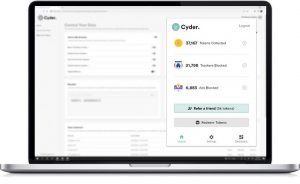The idea of data privacy should be understood as not hiding one’s own personal information but controlling it. Controlling who collects it, who sees it, who does what with it.
More to the point: who profits from it.
Now, a Canadian tech start-up is among those taking action and developing technologies to see we get our fair share of the profits generated with our data. They are offering a browser extension tool with data privacy, ad blocking and help to monetize your personal digital information.
Canadians have seen how companies large and small can collect our data without our knowledge, putting enormous amounts of information about us into a sophisticated computing and analysis infrastructure to see how all that data can be used (in the best-case scenarios) to boost their business, increase customer satisfaction, recommend new products and identify new customers.
Data surprises – be they breaches, losses or something more nefarious – over the years have eventually led to the strengthening of some data privacy, security and control laws at the government level, including proposals that could have companies guilty of breaking new Canadian data privacy and protection requirements paying fines equal to five per cent of global revenue or $25 million, whichever is greater.
And more recent revelations about corporate data collection tactics, like those that surprise us while enjoying a coffee or when picking up a few things for the home, have led some to be more privacy-conscious, using ad-blockers, virtual private networks (VPNs), data-deletion requests and other data privacy tools and technologies in attempt to gain control of their data.
Privacy is a big part of that control, of course, but so too value. We are property owners, after all: our property is valuable and we should control it. And get paid for it when someone else uses it.
It’s clear big tech and big business can make enormous profits by using our data without giving us our due. It’s not fair, data rights advocates say: data has value and values are morals.
That’s one angle being pursued by the Data Dignity movement, for example: we must be treated with morals and value by any company that uses our data.
The movement seeking to take back control of our data has many active proponents worldwide, and some working at Cyder, a Canadian start-up aiming for an Internet where users own and get compensated for their data.
It’s stated mission to ensure data privacy and ownership are accessible to everyone
 The Web 3.0 platform developed there officially launched last year and has reportedly blocked hundreds of thousands of trackers and cookies for its early users.
The Web 3.0 platform developed there officially launched last year and has reportedly blocked hundreds of thousands of trackers and cookies for its early users.
The downloadable software works in the background of an existing compatible browser, like Chrome, bringing added privacy features which make it difficult for companies to track people online without permission while also giving its users an option to get compensated for any information that is willingly shared.
As data compensation for the user community, some 50,000 tokens have been awarded. Users are able to cash the tokens in for rewards, Cyder describes, like loyalty cards at popular food and beverage outlets.
Will Christodoulou and Sukhman Dulay are co-founders of the Toronto-based company (there are company offices in California, too), which is in the midst of developing another product for the Firefox browser.
The pair have also been actively involved in promoting the company and the data ownership concepts behind it, while demonstrating their technology at leading tech accelerators and incubators across North America.

Sukhman Dulay and Will Christodoulou are co-founders of the Toronto-based company Cyder.
They are graduates of the Canadian Catalyst Cyber Accelerator program, for example, the first and only commercial business accelerator in Canada focussed on helping early-stage cybersecurity companies here grow into global industry leaders.
Described as a data trust platform designed to balance the privacy and data needs of users and corporations, Cyder was also chosen by an Advisory Board made up of local and global organizations to participate in Plug and Play Alberta, which represents a broad range of new companies and tech innovators that focus on primarily artificial intelligence, machine learning and fintech applications across different industries.
Companies selected participate in programs covering Health, Sustainability, and Sector Agnostic developments. Nearly half are from Alberta, the rest from other Canadian regions and outside the country.

As data compensation for the community, some 50,000 tokens have been awarded. Users are able to cash the tokens in for rewards, Cyder describes.
Chosen start-ups can participate in networking events, workshops, mentor sessions, private deal-making sessions, and more as they develop proof of concepts, new customers and VC investments. Plug and Play is active worldwide, citing its global network of tens of thousand of start-ups and hundreds of corporate partners, venture capital firms and investors.
Cyder also participated in a Berkeley, California, SkyDeck Demo Day, during which more than a thousand guests participated online and in-person as various international tech companies presented their new products and services.
With their background as data consultants, helping various companies analyze consumer data for behaviour, habits and demographics, Sukhman Dulay and Will Christodoulou say they saw a blatant disregard for consumer privacy in favour of corporate sales and big tech profits.
As Cyder CEO Dulay has said, “We are effectively turning your data into an asset that you control, not big technology companies. You wouldn’t let anyone steal your money, so don’t let them steal your data.”
With Data Privacy Day set for this Saturday, January 28, 2023, developments like those at Cyder may see us celebrate Data Payment Day next year!
-30-



